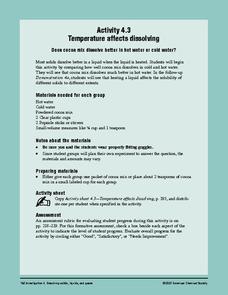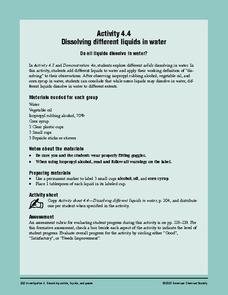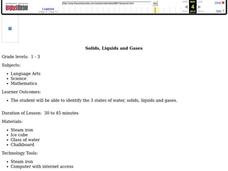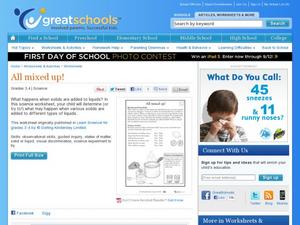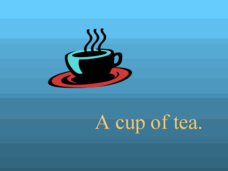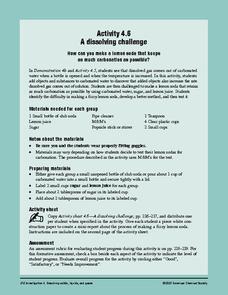American Chemical Society
Temperature Affects Dissolving
Stir chocolate drink mix into hot and cold water to see if there is a difference in how quickly it dissolves. Number three in a six-lesson unit on dissolving, this installment investigates the effect of temperature. If you consult the...
American Chemical Society
Defining Dissolving
Physical science investigators mix sugar and food coloring into different cups of water and cooking oil to compare how the solid and liquid behave in each. As the introduction to this unit on dissolving, it is relevant.
American Chemical Society
Dissolving a Substance in Different Liquids
Second of six lessons in a unit on dissolving, this one focuses on how sugar behaves in different liquids. Learners stir it into water, alcohol, and oil and make observations. This lesson can stand alone, but is best used as part of the...
Curated OER
Dissolving Solids and Gases
For this dissolving solids and gases worksheet, learners learn that the process of dissolving gas is opposite of the process of dissolving solids. Students answer 3 critical thinking questions about dissolving gases and solids in solutions.
American Chemical Society
Dissolving is a Property
Believe it or not, it is possible for liquids and solids to get along! A hands-on lesson has individuals explore dissolving properties of candies in water. They complete an activity guide to record observations about different candies...
American Chemical Society
Dissolving and Back Again
From solid to liquid and then back again. Young scientists dissolve salt in water and then evaporate the water while observing what happens to the solute. They use their observations to make predictions about other solutions.
American Chemical Society
Why Does Water Dissolve Sugar?
Did you know that if you wait long enough, the M on the outside of an M and M will float to the surface when submerged in water? Learners observe the sugar coating of an M and M while it is dissolving in water. They explain how this...
American Chemical Society
Can Gases Dissolve in Water?
Why does soda fizz when opened? Learners discuss the appearance of bubbles in soda bottles when opened. In groups, they design and complete an experiment comparing the amount of carbon dioxide dissolving in cold versus hot liquids.
Curated OER
Mixing Dissolving Quiz
Answer true or false to get through this 11 question quiz on mixing and dissolving. Budding chemists who know their stuff will have no problem determining which dissolving and mixing questions are correct. A basic quiz on the basic...
Curated OER
Amounts of Dissolved Oxygen in Various Bodies of Water
Students test water to determine the dissolved oxygen content while displaying the proper use of testing instruments while visiting water testing sites. They determine if the amount of dissolved oxygen is appropriate for the tested...
American Chemical Society
Dissolving Different Liquids in Water
Not many youngsters realize that solids aren't the only materials that can possibly be dissolved in water. During this investigation, they find out that some liquids can dissolve in water as well. This is part of a unit on solubility,...
Curated OER
Solids, Liquids and Gases
Students explore solids, liquids, and gases. In this states of water lesson, students conduct a scientific investigation that requires them to observe and note the differences among solid, liquids, and gases.
Curated OER
All Mixed Up!
What happens when solids are added to liquids? After reading an informative paragraph about solutions, learners answer six true/false questions regarding solutions, and what substances will dissolve into liquids they are mixed with. A...
Curated OER
"I'm Melting!"
Third and fourth graders engage with a activity designed to help them differentiate between melting and dissolving. After reading an informative paragraph about the two actions, they consider four scenarios, and choose whether they...
Aquarium of the Pacific
States of Matter: Making Ice Cream
Who knew that learning about the states of matter could taste so sweet? This fun hands-on activity captures the attention of learners as they use what they know about solids, liquids, and gases to create their very own batch of ice cream.
Curated OER
Solids and Water
Students investigate mixtures made of water and familiar solid materials. They observe and discuss the changes that occur immediately and set the mixtures aside for a day. Finally, students observe the mixtures, note changes, and graph...
Chemistry Collective
Virtual Lab: Temperature and the Solubility of Salts
Can your scholars solve the mystery of why salts dissolve? A virtual workbench allows them to experiment with temperature and solubility with no solution prep and no post-lab clean up! Users determine the solubility of a variety of...
Curated OER
Water Quality
Students use a microcomputer connected to a conductivity probe to measure the total dissolved solids in local area water samples. Students then compare their measurements with others in their class as well as other standard measurements.
Curated OER
Sugar in Tea
Little chemists address whether or not you can get sugar back out of tea after it has dissolved. The PowerPoint itself simply walks them through the questioning process, considering different possibilities. The final slide settles on...
National Institute of Open Schooling
Solutions
Aqua regia, or royal water in Latin, is a solvent that can dissolve solid gold and platinum into a solution. Activity nine in a series of 36 allows classes to learn, through readings and answering questions, what a solution is and the...
American Chemical Society
Recrystallization Test
Crystallize the answer to the question that has been investigated since the first of four lessons: What is the unknown crystal? Pupils have examined, crushed, and dissolved four samples plus an unknown as an exploration of the properties...
American Chemical Society
A Dissolving Challenge
After collecting carbon dioxide bubbles from a cup of club soda, learners attempt to make their own lemon soda while preventing the loss of carbonation. They do so by creating a syrup before mixing the substances into the club soda....
Curated OER
Review of Ionic and Covalent Compounds and Transitioning from Ionic to Covalent Compounds
Here is a unique assigment: compare and contrast ionic and covalent compounds in an extensive data table and then analyze Lewis dot structures in antoher. Three columns are to befilled in: "characteristic or feature," "applies to ionic...
Curated OER
The Nature Of Dissolving Processes
Students examine the rule of "like dissolves like." They define and describe solutions and solubility models on molecular liquids, ionic solids, and molecular solids.


